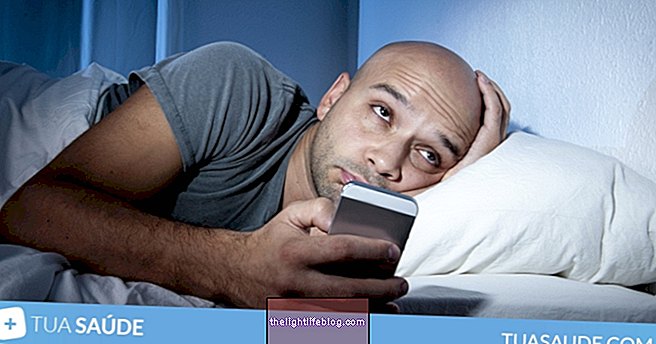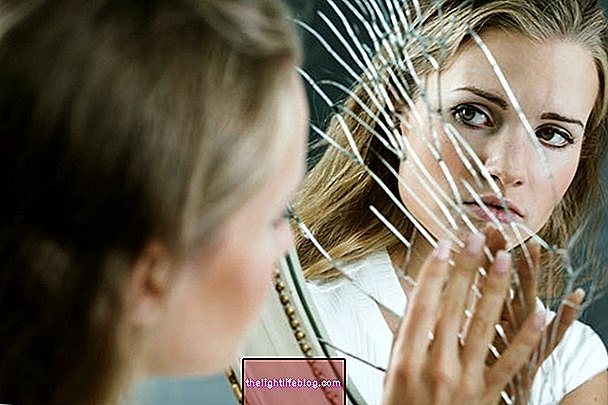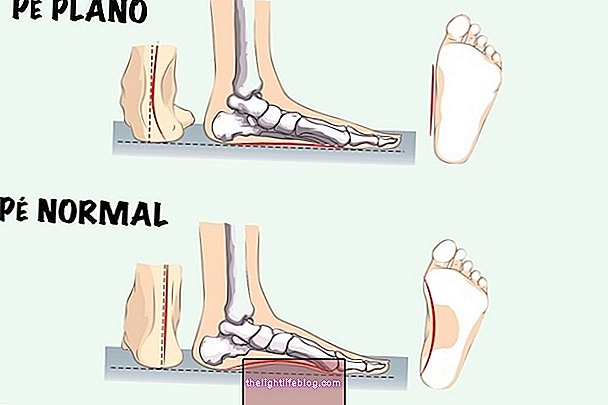Nomophobia is a term that describes the fear of being out of contact with the cell phone, being a word derived from the English expression "no mobile phone phobia"This term is not recognized by the medical community, but it has been used and studied since 2008 to describe the addictive behavior and feelings of anguish and anxiety that some people show when they do not have their cell phone around.
Generally, the person who suffers from nomophobia is known as nomophobia and, although the phobia is more related to the use of cell phones, it can also happen with the use of other electronic devices, such as laptop, for example.
Because it is a phobia, it is not always possible to identify the cause that causes people to feel anxious about being away from the cell phone, but in some cases, these feelings are justified by the fear of not being able to know what is happening in the world or of needing medical assistance and not being able to ask for help.

Main symptoms
Some signs that can help you identify that you have nomophobia include:
- Feeling anxious when you don't use your cell phone for a long time;
- Need to take several breaks at work to use the cell phone;
- Never turn off your cell phone, even to sleep;
- Waking up in the middle of the night to go on the cell phone;
- Frequently charge your cell phone to ensure that you always have a battery;
- Being very upset when you forget your cell phone at home.
In addition, other physical symptoms that appear to be associated with nomophobia signs are addiction, such as increased heart rate, excessive sweating, agitation and rapid breathing.
Since nomophobia is still being studied and is not recognized as a psychological disorder, there is still no fixed list of symptoms, there are only several different forms that help the person to understand if he may have some level of dependence on the cell phone.
Check out how to use your phone properly to avoid physical problems, such as tendonitis or neck pain.
What causes nomophobia
Nomophobia is a type of addiction and phobia that has emerged slowly over the years and is related to the fact that cell phones, as well as other electronic devices, have become smaller and smaller, more portable and with access to the internet. This means that each person is contactable all the time and can also see what is happening around them in real time, which ends up generating a feeling of tranquility and that nothing important is being lost.
Therefore, whenever someone stays away from the cell phone or other form of communication, it is common to fear that you are missing something important and that you will not be easily reached in the event of an emergency. This is where the sensation known as nomophobia arises.
How to avoid addiction
To try to combat nomophobia there are some guidelines that can be followed every day:
- Having several moments during the day when you don't have your cell phone and you prefer to have face-to-face conversations;
- Spend at least the same amount of time, in hours, that you spend on your cell phone, talking to someone;
- Do not use the cell phone in the first 30 minutes after waking up and in the last 30 minutes before going to sleep;
- Place the cell phone to charge on a surface away from the bed;
- Turn off your cell phone at night.
When some degree of addiction already exists, it may be necessary to consult a psychologist to initiate therapy, which may include various types of techniques to try to deal with the anxiety generated by the lack of a cell phone, such as yoga, guided meditation or positive visualization.
Was this information helpful?
Yes No
Your opinion is important! Write here how we can improve our text:
Any questions? Click here to be answered.
Email in which you want to receive a reply:
Check the confirmation email we sent you.
Your name:
Reason for visit:
--- Choose your reason --- DiseaseLive betterHelp another personGain knowledge
Are you a health professional?
NoMedicalPharmaceuticalsNurseNutritionistBiomedicalPhysiotherapistBeauticianOther
Bibliography
- SHANKAR, Vishnu et al .. NOMOPHOBIA: Detection and Analysis of Smartphone Addiction in Indian Perspective. International Journal of Applied Engineering Research. Vol.13. 11593-11599, 2018
- KING, Anna L. S. et al .. “Nomophobia”: Impact of Cell Phone Use Interfering with Symptoms and Emotions of Individuals with Panic Disorder Compared with a Control Group. Clinical Practice & Epidemiology in Mental Health. 28-35, 2014
- YILDIRIM, Caglar. Exploring the dimensions of nomophobia: Developing and validating a questionnaire using mixed methods research. Master's thesis, 2014. Iowa State University.
- PSHYCOLOGY TODAY. Nomophobia: A Rising Trend in Students. Available in: . Accessed on 26 Mar 2019
- LUNA ORMAZA, Yajaira R. Nomophobia in university students, study carried out at the Catholic University of Cuenca, headquartered in Azogues. Grado thesis, 2018. Universidad Católica de Cuenca.























